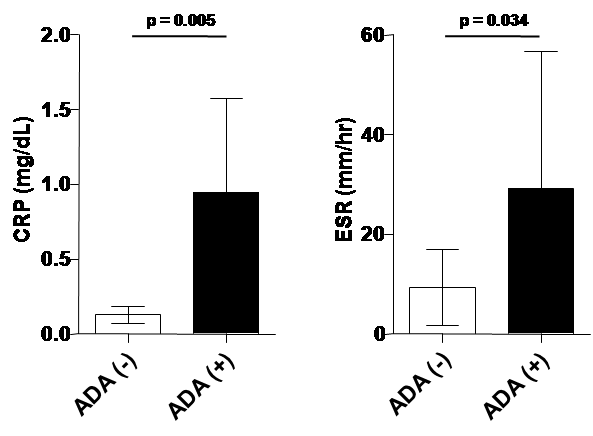Session Information
Session Type: Abstract Submissions (ACR)
Acute Phase Reactant as a Marker of Anti-drug Antibody Formation in Ankylosing Spondylitis
Background/Purpose:
The development of antibodies to biologics is one of the main mechanisms of treatment failure in inflammatory arthritis, including rheumatoid arthritis (RA) and ankylosing spondylitis (AS). However, assessment of anti-drug antibodies (ADA) is not available in routine clinical practice. To address whether acute phase reactants (CRP and ESR) are useful to predict the ADA formation in AS, we analyzed the association between several disease parameters, including the levels of acute phase reactants and the presence of ADA.
Methods:
In a cohort of 21 AS patients treated with TNF-blockers, ADA levels were measured in the serum using an enzyme-linked immunosorbent assay. All except one patient, serial samples were available before (baseline) and after 3 months of TNF-blockers therapy. We evaluated the levels of acute phase reactants and disease activity, as assessed by BASDAI, BASFI and patient global assessment at baseline and at 3 months after TNF-blocker treatment.
Results:
Among 21 patients (adalimumab n=16, infliximab n=5), ADA were detected in 5 (23.8%) patients (adalimumab n=2, infliximab n=3). At baseline, there was no significant difference in laboratory data and clinical activity scores between patients with and without ADA. After 3 months of TNF-blockers, ADA-positive patients had higher CRP levels in serum (0.9 +/- 0.6 ADA-positive vs. 0.1 +/- 0.1 ADA-negative, p=0.005). In addition, ESR levels in serum of patients with ADA were significantly higher than that of patients without ADA (29.2 +/- 27.5 ADA-positive vs. 9.4 +/- 7.6 ADA-negative, p=0.034) (Figure 1). However, we found no significant difference at 3 months in disease activity index according to the presence of ADA. The number of patients who received concomitant treatment with DMARDs or NSAIDs was not significantly different in both groups.
Conclusion:
Patients who developed ADA had significant higher levels of acute phase reactants (CRP and ESR) in their serum after 3 months treatment with TNF-blockers. Acute phase reactant might be useful marker for early detection as well as for evaluation of drug immunogenicity in AS during TNF-blocker treatment.
Figure 1. Differences in levels of acute phase reactants between patient with and without ADA at 3 months after TNF-blocker treatment.
Disclosure:
S. Hong,
None;
E. J. Lee,
None;
Y. J. Kim,
None;
B. S. Koo,
None;
W. J. Seo,
None;
K. J. Ahn,
None;
Y. G. Kim,
None;
C. K. Lee,
None;
B. Yoo,
None.
« Back to 2013 ACR/ARHP Annual Meeting
ACR Meeting Abstracts - https://acrabstracts.org/abstract/acute-phase-reactant-as-a-marker-of-anti-drug-antibody-formation-in-ankylosing-spondylitis/

